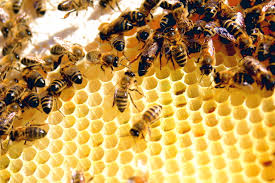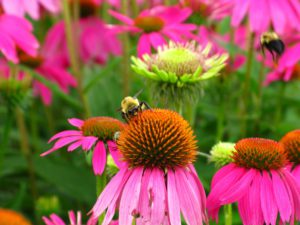Attracting Bees to Your Organic Herb Garden

You can have the best of both worlds by creating an organic herb garden that attracts bees. Going organic or starting an organic herb garden from your backyard is a great way to promote a healthy lifestyle.
Growing organically is catching like wildfire because of the many benefits that are involved. Many backyard gardens are either transformed or started to create a garden of this sort that benefits both us and other pollinators bees being among this group.
The life of a bee
Bees are among many pollinators that are hard at work not only collecting pollen for the production of honey which we enjoy but these tiny engineers also help our garden plants.
Bees move pollen from the male’s anthers which is a part of the stamen that contains this pollen and carries it to the female’s stigma of the seem plant species.
This process is called pollination that causes the production of seeds and fruits. It’s estimated that 75% of the planet’s 25,000species of plants that flowers would not be able to produce seeds or fruits without pollinators (bees).
Studies also have shown that pollinators are responsible and play a major role in the creation of our ecosystem, many animals are depending on them in helping to create their natural habitat providing food and shelter.
There is a quote” as busy as a bee” and I am sure you can see why. These pollinators are extremely busy taking care of the plant and animal kingdom along with assisting us in the production of foods.
Bees are so valuable therefore we should do all that we can to save the bees so they can continue making a major contribution which we depend on.
Planting native
It’s a known fact that installing native plants is the smart and easy way to go, seeking to grow garden plants or herbs that are not native to your zone can and will present issues including discouraging pollinators from visiting your garden. Installing non-native plants is quite the opposite of native plants.
Non-native plants
- Will discourage bees and other pollinators
- Hard to adapt to this new environment
- Requires more maintenance ( time/money)
- There is no guarantee that plant or plants will survive
This list on planting no-native plants in an environment that is not conducive may be short but the problems presented can be major so going native will be of great benefit both to you and pollinators bringing balance to our ecosystem.
A garden free of harmful pesticides
Because we’re growing organically the use of harmful pesticides is a no-no, harmful pesticides will not only contaminate edible food crops but will kill bees and other beneficial insects.
Garden insect pests
Ok, I know what you are saying, how am I suppose to get rid of garden insect pests? besides organics sprays, there are many home-made sprays that are safe to use protecting food crops as well as bees, other pollinators along with, beneficial insects.
These organic sprays can be made from products found right in your kitchen which will also help in saving a few extra bucks from having to purchase sprays from your plant nursery or garden center.
Some garden herbs to consider planting.
I love to grow herbs because of the aroma, flavoring along with their nutrient content and medical purposes. Below is a list of herbs that can be grown from your home garden.

- Chives
- Cilantro
- Mint
- Rosemary
- Garlic
- Parsely
- Basil
- Sage
- Oregano
- Tarragon
- Thyme
- Lemon Balm
Additional information
To benefit from your herb garden along with attracting bees requires proper maintenance.
1. Ensure that your herbs are planted in the right location.
2. The soil type should meet the needs of your herbs.
3. Giving your herbs the right amount of water is so important.
4. The use of organic fertilizers is a must, dry horse, chicken, cow manure, etc… maybe a bit costly but will work wonders or why not consider composting that will save you a few bucks.
5. Companion planting will also assist in attracting bees to your gardens, planting a few flowering plants near your organic garden will help greatly. Install only flowering plants that will attract bees.
6. When installing flowering plants to attract bees around your herb garden group together or plant in clumps.
7. Placing a shallow dish of water near your garden will keep your bee friends buzzing with excitement.
The final word on how to attract bees to your garden
Attracting bees to your herb garden is that simple, all it takes is a little work on your part so bees can also work doing their part ensuring your gardening herbs are performing at their best as you reap a good harvest and enjoy the many benefits of growing organically.
About the author
Norman loves being in the garden, both at home and for his job....
he is 'Natures Little helper' being outdoors, growing his vegetables and flowers from an early age.
Now having spent over 22 years in the profession he want to give some of his knowledge to others...
his vast array of hints and tips you will find scattered over this site will help you no end growing plants in your garden.

What a lovely article on ways to save our very important bees. Although I must admit we have rather too many bees in our garden for my liking and I am always scared of someone getting stung. But I realize they are necessary for our very survival on this planet.
I would definitely use these tips well away from the house, maybe at the bottom of the garden to stop the bees from getting trapped in the house behind windows. Do you know what the life span of a bee is?
Hello so happy to meet you and glad that I could help. When it comes to a bees’ life span it all depends, for example, Western honey bees is anywhere from 122 – 152 days. a queen maybe 4 yrs, then there are other bees that live to about 6 months and so on hope, this answers your question.
You’ve given me even more to think about with your information in this post.
We use only organic methods and have for many years. A few years ago, we added aquaponics and the fact that we were organic already made the transition much easier. Products that kill pests and disease usually also harm or kill fish. Not a good trade off.
I did find it interesting that non-native plants might contribute to fewer bees. As a grower in a rather warm climate (zone 9b) we try to stay with natives anyway, as they adapt more readily and therefore are easier to grow. But I had not given any thought to the bees as a part of this.
Thanks for the great information. I might share this on our fam page, too, to help educate our community!
Hello, so good to meet you, and to hear that you are working the soil on the great outdoors, I am so happy to help, and thanks for spreading this information with your community. Have a good day!
Good information! I see that bees are especially attracted to the flowering plants in my garden that have easy collectable nectar or pollen. Single-flowered plants are much easier for them to access than double-flowered plants. Luckily those are just as pretty. For all year round colour and bees, I choose plants that flower in different seasons.
So good to hear, I guess you must have a very beautiful garden. Continue the good work of attracting pollinators.